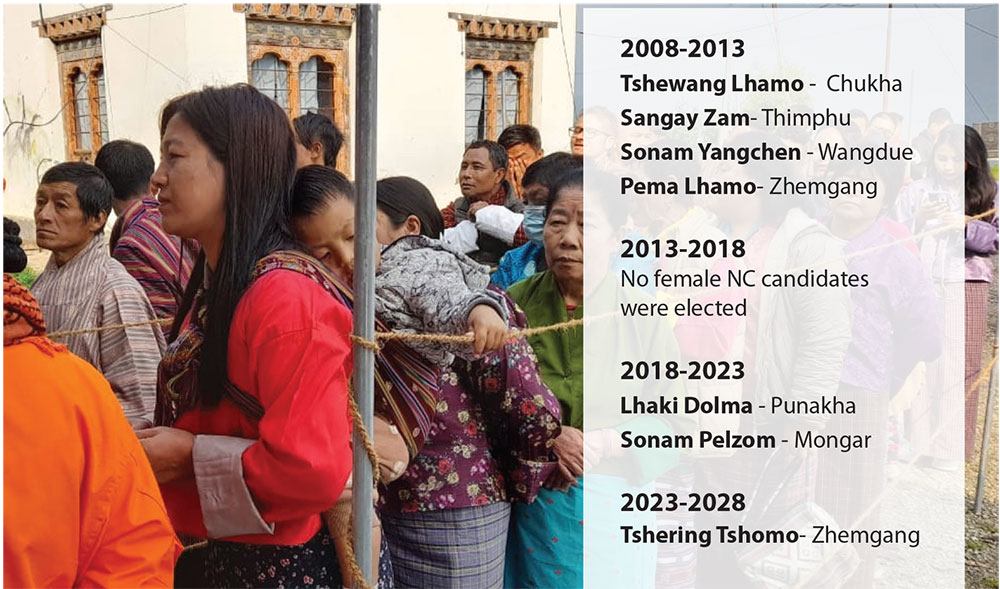There are more women voters than men, but only one out of five got elected
Chencho Dema | Punakha
Bhutanese voters, going by voting records, are gender-biased or still do not trust female candidates, even if the number of voters indicate that more women are turning up to the polls to elect their leaders.
According to figures provided by the Election Commission of Bhutan, more women than men turned up to the polls to cast their ballots in the recent National Council elections.
Only one woman out of the five got elected.
In the past NC elections since 2008, more women have registered to vote and cast their ballots compared with male voters. In the recent 2023 NC election, out of the 485,811 registered eligible voters, 249,072 were female – 51.26 percent or 12,333 more female voters than male.
A total of 265,441 votes were cast of which 130,636 were from male and 134,805 from female. In other words, there were 4,169 more females who voted.
The only way male voters outnumbered women was in the postal ballot facility. There were 2,388 more postal ballots from male. However, on the electronic voting machine- coming out to vote at the polling stations, there were 6,557 more female voters.
In the four dzongkhags of Mongar, Sarpang, Punakha and Zhemgang where female candidates were competing with men, there were more female eligible voters. However, only Zhemgang voted for a female candidate making her the only female NC member of parliament for the next five years, excluding the Eminent Persons.
Tshering Tshomo, 39, from Sonamthang village in Ngangla gewog in Zhemgang defeated four male candidates to win the seat in the Upper House.
Same old story?
Even with an increase in the number of voters casting ballots, female candidates are still underrepresented, going by statistics compiled by the ECB.
In 2008, out of six female candidates only four women were elected. Pema Lhamo from Zhemgang, Tshewang Lhamo from Chukha, Sonam Yangchen from Wangduephodrang, and Sangay Zam from Thim throm.
In 2013, four women contested in the election, but none got elected. In 2018, out of four female candidates, only two were elected. Sonam Pelzom from Mongar, and Lhaki Dolma from Punakha.
“Our electorates need to be more educated, so voter education on democracy and its processes still seem wanting in our society,” according to MP Dil Maya Rai. “Resorting to sympathy votes over experience and ability, whether it be for men or women, is wrong, I think.”
Pema Choden, a voter in Haa said, not many women are in the decision-making post. “This ultimately creates a cycle wherein women cannot believe in women,” she said, adding that a quota system should be relooked into.
Wangdi, a male voter from Punakha said there are not many women candidates contesting. “The situation might alter if more women participate and voters, particularly women in rural areas, abandon their gender-bias concepts. Women are running for office because they are capable,” he said.
A keen political observer said, “There’s no hard rule that women should vote for women. I think voting should be based more on the capability or caliber of the candidate. For Mongar and Punakha, incumbents were already women. So, voters always go for change, not always settling for one permanent member,” he said.
It’s not that female candidates were not elected before, opportunities were given in the past, according to voter, Pema Choki. “Many people believe that female candidates have been less successful in delivering results or making their presence felt that voters were hoping for, thus the decline in confidence for female candidates.”
Female candidates of 2023
Lhaki Dolma, 45, from Dzomi Gewog in Punakha was the lone female candidate to contest against four male contenders during the fourth NC.
She secured 2,843 votes (1,652 EVM and 1191 postal ballots). Punakha has 18,788 registered voters of which 9,852 are female and 8,936 males.
Tshering Tshomo, 39, of Zhemgang secured 3,170 votes to beat four other male candidates.
Of the 20,522 registered voters in Zhemgang, 10,424 are female and 10,098 males.
Mongar dzongkhag had two female candidates. Dorji Wangmo from Gongdue received 3,305 votes and Sonam Pelzom from Tsamang secured 4,349 votes. Mongar has 38,157 registered voters of which 19,853 are females and 18,304 males.


